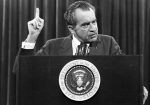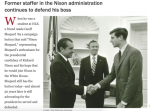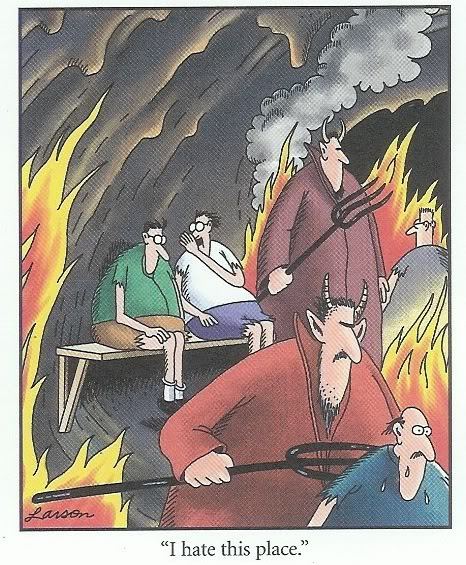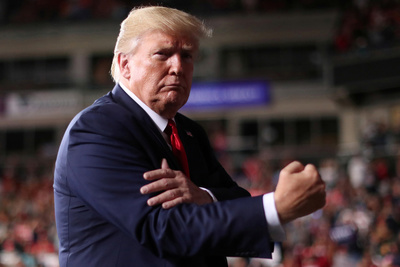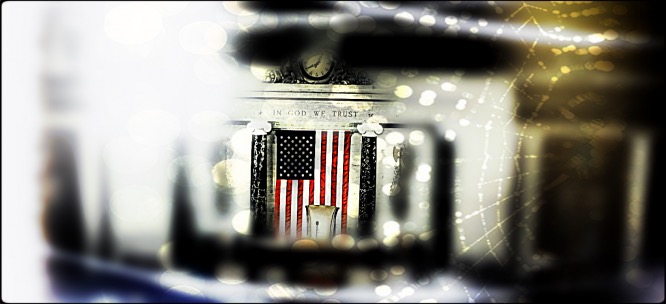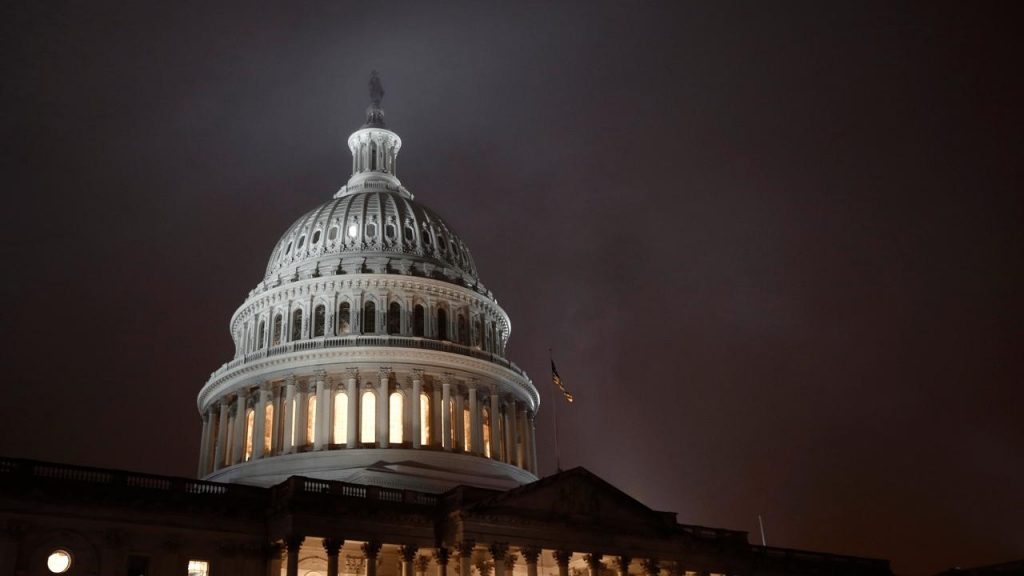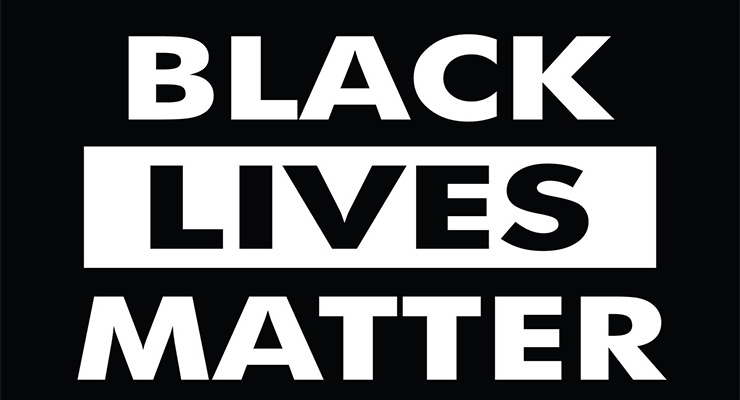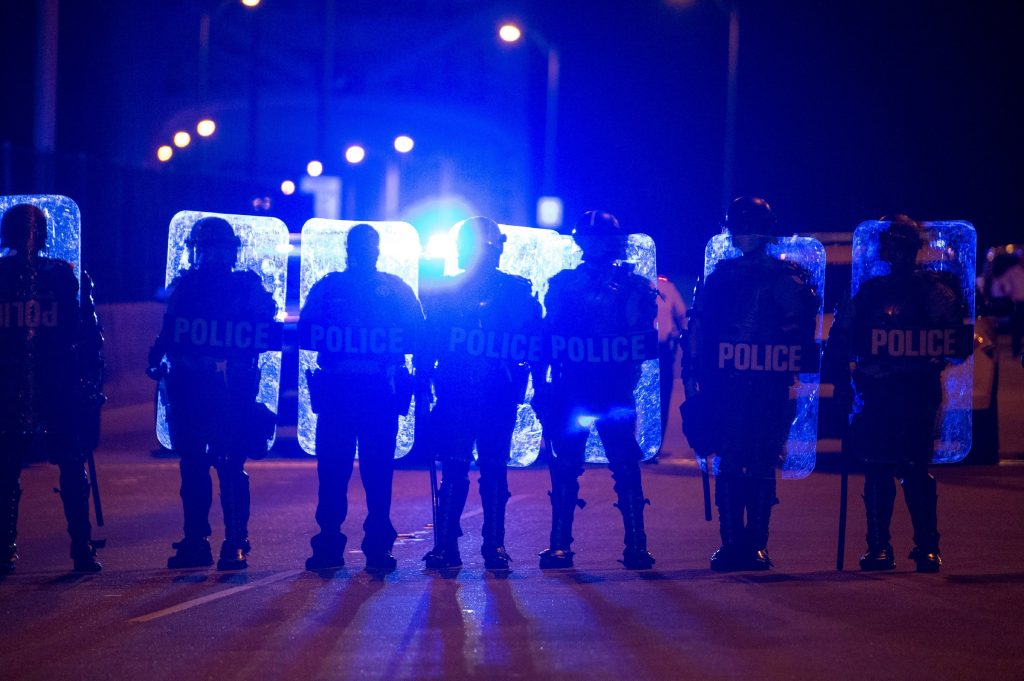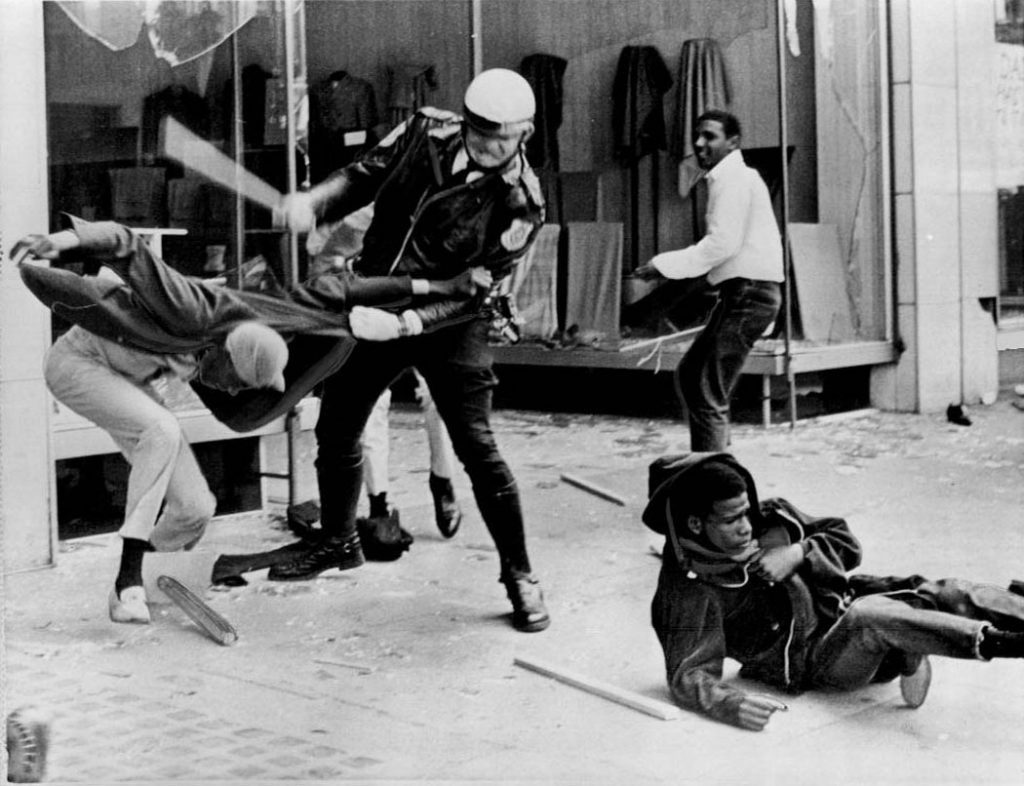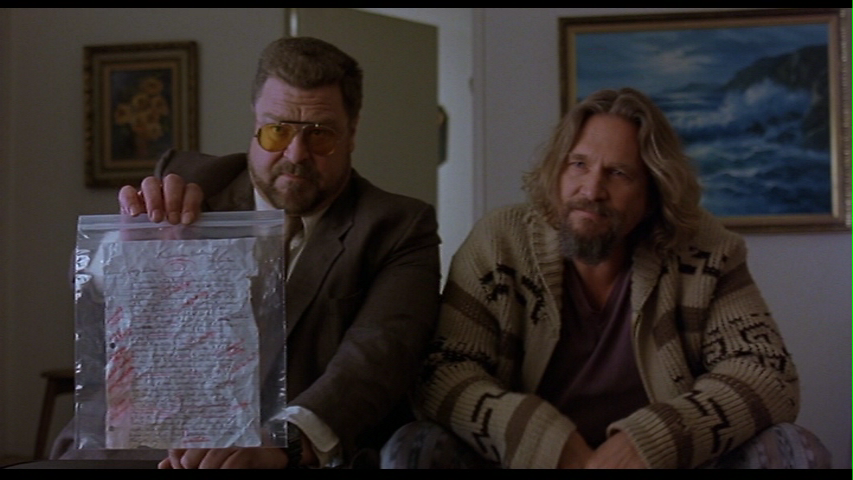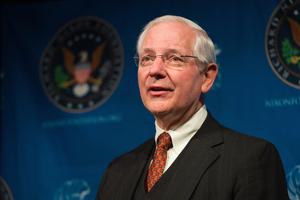
DeViney, Jonathan D.:First and foremost, Mr. Shepard, on behalf of the staff and readership of ModState, thank you for taking the time to discuss your pivotal work, “The Real Watergate Scandal” and the outrageous witch-hunt that dragged a lot of good people through the mud and sent numerous men to prison. Deserved or not, it’s clear the deck was stacked and justice, therefore, has not been served.
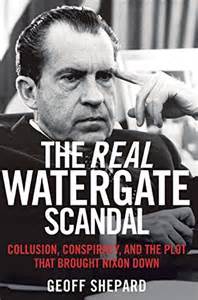
Shepard, Geoff (Esquire): It is true that the Watergate scandal remains the greatest political scandal in modern American history. It not only resulted in President Nixon’s resignation, but also in the conviction and imprisonment of over two dozen members of his administration. We now know, however, that other Presidents and their administrations both before and since President Nixon’s have committed far more egregious offenses that have gone unpunished. I appreciate the opportunity to set the record straight and to show how a unique set of circumstances resulted in the demise of the Nixon presidency.
Without telegraphing too much of our interview, the necessary elements are four: First, there must be a scandal of some sort – but history shows us that there’s almost always a scandal. It’s just that they don’t usually come to dominate the public’s attention. Second, both Houses of Congress must be dominated by the opposition, which is an extreme form of Divided Government. In Nixon’s case (largely as a result of the 1964 Goldwater debacle), Democrats controlled two-thirds of each House. Third, there has to be a highly politicized Special Prosecutor. The last Special Prosecutor before Watergate was in the 1920s during the Teapot Dome scandal. There have been many more since, but this “reform” is now seen as a perversion of our criminal justice system where prosecutorial discretion can be abused for partisan political purposes. Finally, there has to be a turncoat, a senior figure who dramatically changes sides and becomes a part of the opposition. In Nixon’s case, it was John Dean, his former lawyer. Dean had been, by his own admission, the “chief desk officer” of the cover-up. I know of no instance comparable to Dean’s treachery, unless it was that of Benedict Arnold during our Revolutionary War. In switching sides, mainly to avoid prosecution for his own criminal misdeeds, Dean became the principle conduit to President Nixon and his most senior aides (John Mitchell, H. R. Haldeman and John Ehrlichman). Nixon’s many opponents had no interest in cross-checking Dean’s accusations, since that would only harm their efforts to “Get Nixon” at all cost.
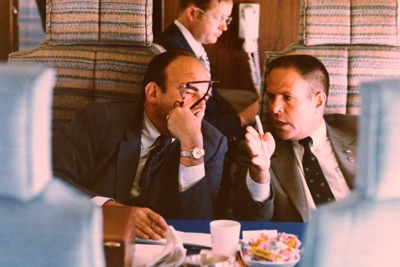
DeViney: I know this question takes us very deep very quickly, but the point you make in “The Real Watergate Conspiracy” and in your statements this year at Harvard Law, the longstanding desire, the sickening collusion and lack of transparency that occurred, where does it go back to? Is it more than just the fact that he came from nothing and still beat “them?” Does it go back to Alger Hiss? I agree it’s “visceral” and “startling,” as you put it. Any thoughts on where it leads back to?
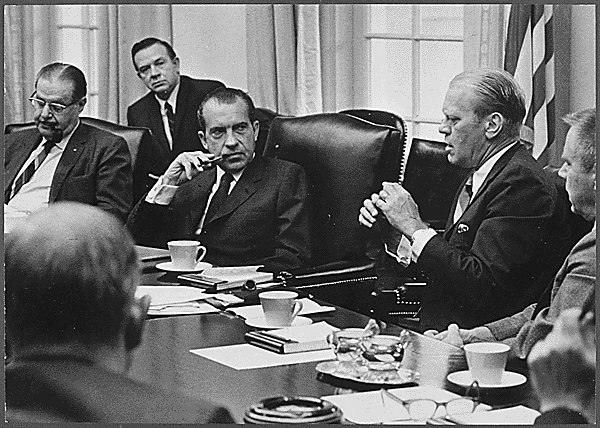
Shepard: you raise a good point. One of the other unique characteristics of Richard Nixon, that certainly contributed to his demise, is that he was an ultimate outsider. He not only came from nowhere: a small town in California, far from the Eastern liberal establishment that essentially ran the country at that time, he was not wealthy, he was not blessed with a handsome countenance, and he did not have the benefit of an Ivy League education. Perhaps worse, he came into national political fame as a freshman Congressman leading the investigation into whether Alger Hiss had been a Communist spy. Now, Hiss was Nixon’s opposite: A Harvard Law graduate, a protégé of Felix Frankfurter, and a senior official in the State Department under Presidents Roosevelt and Truman. In short, Hiss was the epitome of the Eastern liberal establishment. And, Nixon’s dogged pursuit and taking down of Hiss, earned him their undying enmity.
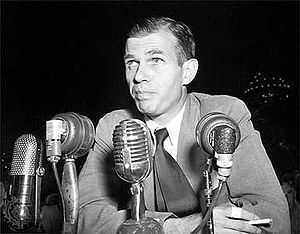
So when Watergate troubles came, as they certainly did, the Eastern liberal media had an absolute field day. After all, Nixon had just won a landslide re-election – and this was their last clear chance to stop him and all that he represented as a very real threat to their continued dominance of American politics.
DeViney: John Dean, in recent years (2014, I believe) acknowledged the whole “Smoking Gun” bit misconstrued. On 24 July, 1974, the SCOTUS ruled 8-0 (with Rehnquist recusing himself) regarding executive privilege and the tapes. Senator Goldwater said he was on the fence (along with a handful of other senators regarding a potential trial) and the committees were stacked and Republicans turned on the man largely responsible for resurgent Republican success. Why, after the 77-0 vote (with many Republicans walking out on the vote) on the establishment of a committee (beyond Ervin) stacking the deck, why did they turn? Did no one want to see the obvious? Or is this more of a coordinated effort by the collective to save their own tail by distancing themselves from the President? It’s just…unbelievable how the chips fell there. Any thoughts, Sir?
![[image copyright: TIME Magazine]](https://www.modstate.com/wp-content/uploads/2016/10/JohnDean.jpg)

Regardless, what happened immediately after the Supreme Court’s ruling is what totally undermined President Nixon’s Watergate defense and led directly to his resignation: His defense lawyers, for the first time, were directed to listen to one particular tape, the tape of June 23, 1972 – occurring but six days following the original Watergate burglary arrests). In that tape, President Nixon is heard concurring with his staff’s suggestion that they prevent FBI interviews of two people by getting the CIA to ask the FBI to back off. This tape became known as “the Smoking Gun” and its public release on August 5th ended all support for President Nixon and led directly to the announcement of his resignation three days later.
Here’s why the Smoking Gun was to devastating: Until its release, the Special Prosecutor’s investigation and the Nixon defense had focused on what the President had done after his March 21, 1973 meeting with John Dean – where Dean testified he had first informed the President of specifics of the ongoing Watergate cover-up. Yet, the Smoking Gun tape seemed clearly to indicate Nixon’s own knowledge and involvement dated from eight months earlier—beginning as little as six days after the break-in arrests.
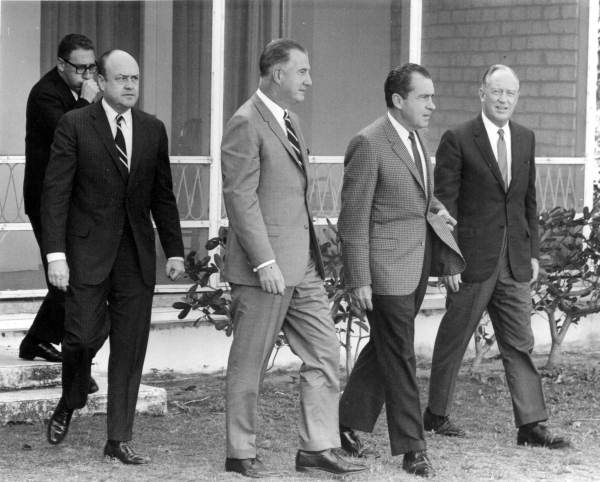 What is so fascinating about the Smoking Gun tape is that it was (and has been) totally misunderstood. In spite of its apparent confirmation of Nixon’s involvement, it develops that the sole purpose of getting the FBI to back off interviewing two witnesses was to prevent disclosure of substantial campaign contributions by two prominent Democrats (who were secretly contributing to Nixon’s re-election campaign to hedge their bets and show support of the one they felt certain to win the upcoming election). What is so interesting about the Smoking Gun tape is that all of the involved parties – H. R. Haldeman, John Mitchell, Maury Stans, Patrick Gray and even the President’s principal accuser (John Dean) agree with this revised interpretation of the tape. As Dean said in his most recent book, if the tape had been properly understood at the time, Nixon might have survived to fight again another day.
What is so fascinating about the Smoking Gun tape is that it was (and has been) totally misunderstood. In spite of its apparent confirmation of Nixon’s involvement, it develops that the sole purpose of getting the FBI to back off interviewing two witnesses was to prevent disclosure of substantial campaign contributions by two prominent Democrats (who were secretly contributing to Nixon’s re-election campaign to hedge their bets and show support of the one they felt certain to win the upcoming election). What is so interesting about the Smoking Gun tape is that all of the involved parties – H. R. Haldeman, John Mitchell, Maury Stans, Patrick Gray and even the President’s principal accuser (John Dean) agree with this revised interpretation of the tape. As Dean said in his most recent book, if the tape had been properly understood at the time, Nixon might have survived to fight again another day.
I might add that I’m rather familiar with the Smoking Gun tape: I was the third person (after Nixon and his lead defense lawyer) to listen to it. I prepared the official transcript of that conversation which was ultimately released to the public, and I was the one who first termed it “the Smoking Gun” tape. Along with others, I was also totally wrong in my initial interpretation of its contents.
With all that as background, let’s go back to your original question: why did Republicans stand aside and let this happen to Nixon? You have to remember the times: (1) Nixon had been re-elected by a wide margin, but had no coattails. Republicans remained substantial minorities in both the House and the Senate. There was deep resentment on Capitol Hill that he hadn’t been more successful in helping other Republicans win seats. Perhaps worse, Nixon was now a lame duck and would never again run for office. His influence and ability to command loyalty was diminishing. (2) There were real crimes (and real criminals) involved in Watergate. The burglars had been caught red-handed – and they clearly worked for the President’s re-election campaign. And there was no doubt about a criminal cover-up. Yes, there were genuine questions as to just who had been involved, but this was a real can of worms. Why get involved in Nixon’s defense at all? (3) The liberal media and a highly politicized Special Prosecutor staff of over a hundred people were in full pursuit. Why stand in front of that freight train?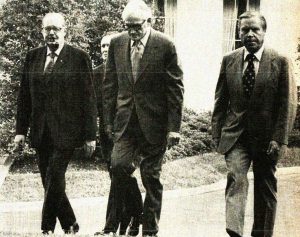
As the scandal unfolded, each Republican officer holder had to make the decision as to whether they still stood with Nixon. It was a question of self-preservation and they made an understandable choice. After all, Nixon and his staff were convicted in the court of public opinion long before the cover-up trial even began.
DeViney: The adage “actions speak louder than words” is pervasive and, though I haven’t analyzed this through the scientific method, likely believed by the majority of the country. The reason I mention this is because a lot of attention is given to the profanity and ethnic references and slurs, especially on the part of President Nixon, on the tapes. Conversely, as the leftists forget, Nixon fought harder for Civil Rights and was obstructed by Democrats until long after the passage of the CRA he peacefully desegregated Southern schools and instituted the Philadelphia Plan, of great benefit to the black community in a macroeconomic sense and, thusly, opening a vast amount of doors (such as interview quotas for government jobs) that had never been opened to blacks. Nevertheless, all of that gets ignored because he [allegedly] used “The N-Word” and, it seems at times, [allegedly] in a derogatory sense. I just wonder, if actions do speak louder than words, could his frustration have been directed at the Black Panthers and not the black community considering all the good he did in that regard? I’m not excusing the language, but isn’t that something of merit for consideration?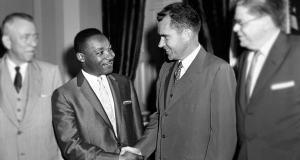
Shepard: You are correct with regard to Nixon’s long standing advocacy for civil rights, voting (as he did) in favor of every single civil rights act as a Member of Congress – and his administration compiled a most distinguished record on civil rights. As deputy to Nixon’s lead Watergate defense lawyer, I spent hundreds of hours listening to the White House tapes and polishing their transcripts – principally the ones the White House released to the public on April 30, 1974. It’s been forty years, but I cannot recall a single instance where President Nixon used the N word or spoke disparagingly of Blacks.
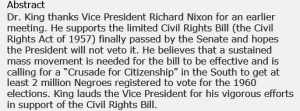 He certainly said some disparaging things about Jews, but virtually all of what he said was in the context of Jews as a voting bloc. He was frustrated at having done so much for Israel (particularly his saving actions during the Yom Kipper War), and yet having them vote consistently for Democrats. Here, too, Nixon’s actions speak louder than his words: he appointed more Jews to high position in his administration than any President before or since. On the White House level, these include Dr. Henry Kissinger, perhaps the most important Presidential appointment of all; Leonard Garment, with a broad portfolio that includes civil rights, arts and humanities, long term planning and much more; William Safire, the President’s chief speech writer; Edward David, Special Advisor for Science and Technology; and Jerome Jaffe, Special Consultant for Narcotics and Dangerous Drugs.
He certainly said some disparaging things about Jews, but virtually all of what he said was in the context of Jews as a voting bloc. He was frustrated at having done so much for Israel (particularly his saving actions during the Yom Kipper War), and yet having them vote consistently for Democrats. Here, too, Nixon’s actions speak louder than his words: he appointed more Jews to high position in his administration than any President before or since. On the White House level, these include Dr. Henry Kissinger, perhaps the most important Presidential appointment of all; Leonard Garment, with a broad portfolio that includes civil rights, arts and humanities, long term planning and much more; William Safire, the President’s chief speech writer; Edward David, Special Advisor for Science and Technology; and Jerome Jaffe, Special Consultant for Narcotics and Dangerous Drugs.
In the Executive Office, were Herbert Stein, Chairman of the Council of Economic Advisors; Ezra Solomon, member of the Council; Arnold Weber, Executive Director of the Cost-of-Living Council and Ronald Berman, Chairman of the National Endowment for the Humanities. In addition, there was Arthur Burns, Chairman of the Federal Reserve Board and Jesse Steinfeld, Surgeon General of the US. At the sub-Cabinet level, Jews filled the posts of Undersecretary of Labor and Assistant Secretaries of Treasury; Defense; Health, Education and Welfare; Housing and Urban Development, and the Office of Management and Budget.
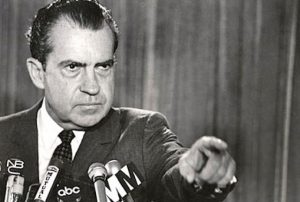 But what really shocked people about the tapes was Nixon’s swearing, conveniently omitted through the term “Expletive Deleted.” It made Nixon look like he swore like a fishmonger – but this too was largely untrue. I should know, since I was the one responsible for the removal of these words. In transcribing the tapes, I became the “Expletive Deleter” if you will. What is so fascinating is that – with but two or three exceptions – the term I inevitably was called upon to omit was “God damn”. Nixon used the term incessantly – and almost exclusively as an adjective: “the God damn paper” or “the God damn vote.” The trouble was that when we omitted it, it looked to most people that we had eliminated the F word, and not the more mundane actual term. Now, to Nixon (who insisted on the omissions) it could have been worse to use the Lord’s name in vain, but to me this was what I termed “the Baptist filter”: not of swear words, but words of religious impropriety.
But what really shocked people about the tapes was Nixon’s swearing, conveniently omitted through the term “Expletive Deleted.” It made Nixon look like he swore like a fishmonger – but this too was largely untrue. I should know, since I was the one responsible for the removal of these words. In transcribing the tapes, I became the “Expletive Deleter” if you will. What is so fascinating is that – with but two or three exceptions – the term I inevitably was called upon to omit was “God damn”. Nixon used the term incessantly – and almost exclusively as an adjective: “the God damn paper” or “the God damn vote.” The trouble was that when we omitted it, it looked to most people that we had eliminated the F word, and not the more mundane actual term. Now, to Nixon (who insisted on the omissions) it could have been worse to use the Lord’s name in vain, but to me this was what I termed “the Baptist filter”: not of swear words, but words of religious impropriety.
The bottom line, however, is clear. Every President from Franklin Roosevelt to Nixon secretly taped at least some Oval Office conversations. But Nixon taped them all – and release of those transcripts showed him to be a petty, vindictive person; all too human and certainly not Presidential.
DeViney: Something of an aside, but do you feel, Sir, that had the Watergate debacle(s) not occurred that the GOP would likely be known as “The Party of Nixon” or “The Party of Lincoln, Nixon and Reagan” or some variant thereabouts?
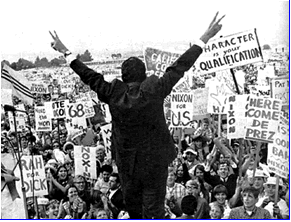 Shepard: That’s easy: Watergate aside, Nixon would have gone down as one of America’s greatest Presidents. His triumphs in foreign affairs are legendary: The opening to China, détente with the Soviet Union, ending the Vietnam War with the Paris Peace Accords, and his handling of the Middle East (wooing Egypt from the Soviets and saving Israel during the Yom Kippur War) launched America’s golden age of diplomacy. His domestic initiatives are not as appreciated, but were tremendously creative and influential: Peacefully desegregating the southern schools, creating the Environmental Protection Agency (along with passage of the clean air and water acts), restoring rights to Native Americans, ending the draft, giving 18 year olds the vote, quadrupling the number of women appointed to high government positions, laying out basic concepts for welfare and healthcare reform (which ultimately passed decades later), restoring law and order and ending “legislating” by the Supreme Court though five distinguished appointments.
Shepard: That’s easy: Watergate aside, Nixon would have gone down as one of America’s greatest Presidents. His triumphs in foreign affairs are legendary: The opening to China, détente with the Soviet Union, ending the Vietnam War with the Paris Peace Accords, and his handling of the Middle East (wooing Egypt from the Soviets and saving Israel during the Yom Kippur War) launched America’s golden age of diplomacy. His domestic initiatives are not as appreciated, but were tremendously creative and influential: Peacefully desegregating the southern schools, creating the Environmental Protection Agency (along with passage of the clean air and water acts), restoring rights to Native Americans, ending the draft, giving 18 year olds the vote, quadrupling the number of women appointed to high government positions, laying out basic concepts for welfare and healthcare reform (which ultimately passed decades later), restoring law and order and ending “legislating” by the Supreme Court though five distinguished appointments.
Nixon was well on his way to greatness — but Watergate did occur and he didn’t handle it properly. It’s one of the toughest calls any of us may be called upon to make: At what point do you realize that your own people have been lying to you? Nixon was concentrating on the many challenges of being President – and didn’t pay enough attention to the inclination of some of his people to cover up their own wrongdoing.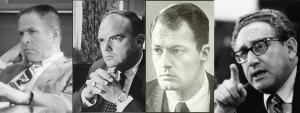
DeViney: For those of us belonging to an era of “young people” who (to put it kindly) have clearly lost their way (X, Y, “Millennials”), how does one even begin a discussion to be taken seriously about Nixon being more than about Watergate? As my father puts it, “Good luck getting the [un-liberal] liberals to read anything that doesn’t demonize Nixon.”
Shepard: It’s an interesting situation. Not only do the liberals have a vested interest in keeping Nixon alone at the top of the list of corrupt Presidents, but Republicans have long ago given up trying to defend him. You will note that inevitably any scandal of today is quickly given the suffix “-gate.” And any comparison to other scandals is certain to include Nixon and Watergate as the gold standard for political corruption, the only and ultimate worst.
![Nixon [left] with Geoff Shepard [far right]](https://www.modstate.com/wp-content/uploads/2016/10/NixonShepard-300x230.jpg)
DeViney: On the Harvard Law page where you kid about the current crop buying your tremendous work (“The Real Watergate Conspiracy”) for their parents, there’s reference made to the possibility of litigation towards the end of correcting the historical record on behalf of Nixon. Amidst the ongoing onslaught of Nixon-smearing, to what end would you like to see said litigation go, if any (if it should happen?)
Shepard: What I have uncovered and forms the core of my recent book is widespread and substantial misconduct by judges and Watergate prosecutors or other interested parties. Most Americans would agree that, no matter how heinous the crime, no matter how disreputable the accused, they still deserve a fair trial. It’s clear in retrospect that the Watergate cover-up defendants did not get anything close to a fair trial. Since confirmation of this judicial and prosecutorial misconduct has only recently come to light, I would like to see their convictions challenged by a Writ of Coram Nobis. There is still time for this to occur, but it would be a long shot and would have to be brought in the next several months.
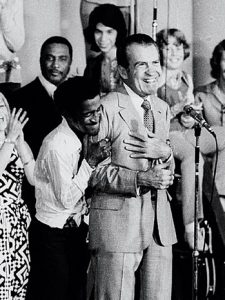
That said, as one of my colleagues has pointed out, my book lays out such a strong case for the lack of due process, that no future historian, scholar or researcher can write about the Watergate trials without taking my disclosures into account.
DeViney: Last but certainly not least, Sir, and this comes from my perspective as an economics major and entrepreneur in the media and also it comes from my heart: what can we do, aside from promoting your book, to help foster the essential correction of so many records now? The Washington Post even declared on their website section devoted to these topics that it’s proceeding from history into mythos. Yet, as you and I both insist, this is fundamentally unjust, highly unethical and simply dangerous to be allowed to persist. So what can be done?
Shepard: I’ve sort of touched around the edges of this in my previous answers. Nixon’s record as President is hugely impressive, and that will have to be recognized by future scholars and historians. It’s also the most documented administration in our history, so there’s plenty of material to work from. As you may know, the permanent exhibits of the Richard Nixon Presidential Library have been totally redone and will reopen to the public later this month. You can see it in person in his hometown of Yorba Linda, California, or view it on line. It’s an impressive story of how this determined young man, without family wealth or influence, without Hollywood good looks, and without an Ivy League education, rose to the pinnacle of American politics – and there representing much more the common man and not the well-connected.
DeViney: Sir, thank you so very much for your time. You’ve won an admirer in me and my father, especially being grateful for your strenuous, passionate and surgical efforts to correct the record. On behalf of ModState, I not only again extend my thanks but would love to know what we can do, as a media outlet, to foster discussion of these matters and help advance a cause that is beyond just, verging on classical nobility (due to the level of dedication involved here). We’ll put a logo link to your wonderful work and your website on our network page, and please do keep us posted so that we may help increase awareness of this just crusade. Sir, it has been an honor, and I look forward to our meeting someday in Pennsylvania (where my father was born in the Pittsburgh area) or the next time you’re down here in New Orleans. Thanks again, Sir, and may God bless you in your efforts beyond your greatest expectations.
